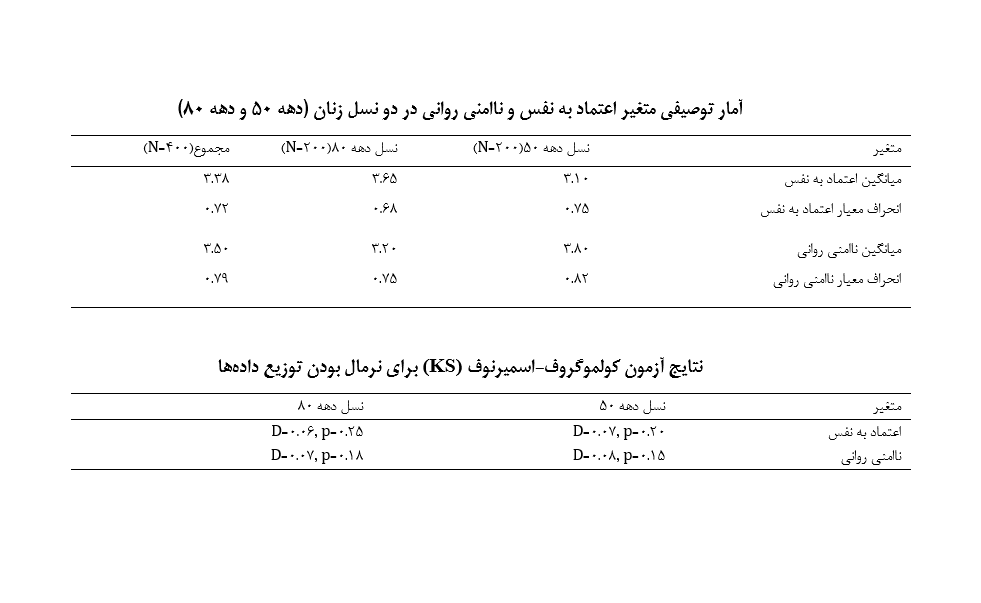The Impact of Social Non-Acceptance on the Identity and Values of Women Born in the 1970s and 2000s in Shiraz
Keywords:
Shiraz, different generations, women, social values , gender attitudes, Gender discriminationAbstract
This study aimed to examine how social non-acceptance influences self-confidence and psychological insecurity and to compare generational differences in the identity and values of women born in the 1970s and 2000s in Shiraz. A quantitative, descriptive–survey design with an intergenerational comparative approach was employed. The statistical population included 400 women (200 from each generation) in Shiraz, selected through multi-stage cluster sampling. Data were collected using a researcher-made questionnaire based on Tajfel’s social identity theory and feminist perspectives. Reliability was confirmed by Cronbach’s alpha (0.87), and validity was established through confirmatory factor analysis and expert review. Independent t-tests, Kolmogorov–Smirnov tests, and multiple regression analyses were conducted. Results indicated significantly higher self-confidence in the younger generation compared to the older (t = -5.92, p<0.001) and significantly greater psychological insecurity among older women (t = 6.34, p<0.001). Regression analysis showed that social non-acceptance negatively affected self-confidence and increased psychological insecurity (B = -0.45, p<0.001). Age and education level were identified as key moderating factors in the intensity of these effects. The findings highlight profound generational changes in women’s psychological and social identity. Women from the 1970s faced stronger traditional constraints and social discrimination, leading to lower self-confidence and greater insecurity, whereas younger women benefit from improved educational and social opportunities. Strengthening social support, expanding educational access, and implementing empowerment-oriented policies are crucial for mitigating the negative impact of social non-acceptance.
Downloads
References
Safiri K. Women's Social Identity in Iran. Journal of Social Sciences, University of Tehran. 2018.
Kalani M. A Critique and Analysis of Women's Social Identity in Iran. Quarterly Journal of Women's Studies. 2014.
Nikipour M. Investigating the Psychological Effects of Social Non-Acceptance on Women. Journal of Social Studies. 2011(20):45-60.
Iman MT, Soroush M. Intergenerational Comparison of Economic, Social, and Cultural Capitals Available to Women in Shiraz. Quarterly Journal of Women in Development and Politics. 2013.
Zolfalifam F, Ghaffari M. Sociological Analysis of Female Students' Social Identity. Journal of Social Sciences. 2009(22):40-58.
Dehghani R. The Impact of Culture and Media on Women's Social Identity. Sociology Research Journal, University of Tehran. 2020(12):87-105.
Sato Y. Social Identity Theory. 2025.
O'Reilly C, Maher PJ, Smith EM, MacCarron P, Quayle M. Social identity emergence in attitude interactions and the identity strengthening effects of cumulative attitude agreement. European Journal of Social Psychology. 2024;54(1):97-117. doi: 10.1002/ejsp.3000.
Mojab S. Nadia Jones-Gailani. Transnational Identity and Memory Making in the Lives of Iraqi Women in Diaspora2022.
Borbour A, Tajik Esmaili S. The Perspective of Women's Social Identity Based on the use of Instagram. Communication Research. 2022;29(110):159-96. doi: 10.22082/cr.2022.554286.2352.
Arabi Z. The impact of virtual social networks on the social identity of women (ages 18 to 45) in Bushehr: Master's thesis, Payame Noor University of Bushehr Province, Bushehr Payame Noor Center; 2022.
Kamyab F, Hoseinzadeh A. The Psychological Impact of Social Expectations on Women’s Personal Choices. Psychology of Woman Journal. 2023;4(2):169-76. doi: 10.61838/kman.pwj.4.2.20.
Rahmatabadi S, Aghabakhshi M. Youth Identity Boundaries and the Impact of Lifestyle. 2006.
Gillooley S-M. The Self-Perceived Age of GenX Women: Prioritising Female Subjective Age Identity in Marketing. European Journal of Marketing. 2023. doi: 10.1108/ejm-04-2022-0267.
Balouri M. Social support and the redefinition of identity among women who have lost their spouses as mothers: Islamic Azad University, Garmsar Branch; 2021.
Appachu H, Singh JK. Understanding the social identity of adolescents in the Indigenous Kodava Community of India. Journal of Research on Adolescence. 2024. doi: 10.1111/jora.12962.
Raja R, Jian-fu MA, Tao R, Ullah S, Li XY, Shafi MM. Social Identity Development in Transnational Marriages of International Students in China. Humanities and Social Sciences Communications. 2024;11(1). doi: 10.1057/s41599-023-02396-1.
Haghighat Ghahfarokhi F, Hosseini SA, Ghaderi E, Mahmudzadeh SM. Semantic Analysis of women's identity construction in tourism (Case study: women working in ecolodges of Kerman province). Woman in Development & Politics. 2023;21(1):82-53. doi: 10.22059/jwdp.2022.347099.1008246.
Jian L, Skeem JL. Getting Traction on Positive Youth Justice: Prosocial Identity as a Promising Target for Intervention. Psychology Public Policy and Law. 2024;30(2):132-48. doi: 10.1037/law0000410.

Downloads
Published
Submitted
Revised
Accepted
Issue
Section
License
Copyright (c) 2025 Mehdi Ahmadi (Author); Samineh Bahadori Jahromi (Corresponding author); Abdolhamid Delshad (Author)

This work is licensed under a Creative Commons Attribution-NonCommercial 4.0 International License.










